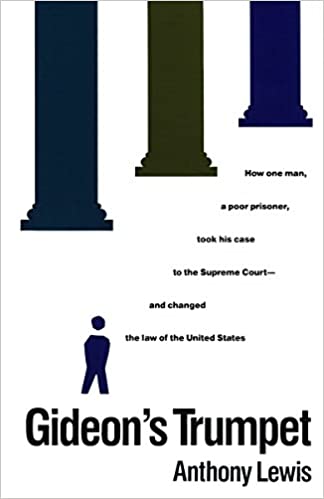Anthony Lewis – Gideon’s Trumpet Audiobook
Anthony Lewis – Gideon’s Trumpet Audiobook (How a poor prisoner took his case to the Supreme Court)-Changing the Law of the United States

Gideon’s Trumpet Audiobook Online
This semester, I am taking Modern American Legislation. book It was one of the required texts. The book It is misleading because its size doesn’t reflect the amount of information it provides on each page. This book and its web contents attracted me to page one. This is the final page. bookIt is as if you were a major player in this particular situation. This is incredible! bookI agree with you and would recommend it to any student of legislation. Clarence Earl Gideon was held for a minor crime and, because he couldn’t afford one, asked for an attorney to represent his case in court. His demand was rejected. He was found guilty of the crime and sentenced to five year imprisonment in Florida State Prison. Gideon’s Trumpet Audiobook Free. He used a pencil and prison letterhead to appeal to the Supreme Court for a writ de certiorari. Gideon claimed that the lower court had deprived him of his Sixth Change rights to have a lawyer for protection. He also stated that he had been denied due process under Section Fourteenth Amendment.
Gideon’s The chance of finding a needle in the haystack was infinitely greater than hearing his case heard by Supreme Court. It was. Gideon v. Wainwright (1963), changed the entire training course in American law. Gideon’s Incredible story and the tale of the Supreme Court choosing and choosing instances are the subjects of this very legible article book By Anthony Lewis. Lewis He is well-versed in the workings of the American judiciary system. He was a reporter for the New York City Times who covered the High Court from 1957 to 1964. From 1974 to 1989, he also taught law at Harvard.
Each term, the Supreme Court receives approximately 2500 charms (or did so at time of writing). Gideon’s 150 people are granted a hearing. The High Court’s testimony is based on the passion of law, the proper presentation and enforcement of it, and not the rate of interest of plaintiffs,” writes Principal Justice Charles Evans Hughes. Simply put, the Court approved. Gideon’s It is not attracted by its good intentions, but because it has to address a legal problem. The Court was curious about whether criminal offenders were being denied their civil liberty because they were trying to be tried in state court. Federal court provided legal guidance to defendants who did not have any other options. It was their constitutional right under federal law. Yet under state legislation? That was a different concern altogether. The Bill of Legal rights guarantees did not apply to the states. The author writes, “Our Constitution established a system that included dual federal governments, both state and government, each with their very own legislations.” Gideon was not granted the right to an advocate when he was tried in a state court. Gideon was fortunate that issues of government legislation can occasionally arise in state courts. Consequently, appeals are possible.
Twenty years ago, in a similar case (Betts, v. Brady 1942), the Court ruled in favor of state–an indigent criminal defendant didn’t deserve to have a lawyer. Gideon’s charm was filed in 1962. The court’s composition had changed significantly (even more liberal/more active) and the Court decided to reconsider its prior decision. Anthony Lewis – Gideon’s Trumpet Audio Book Online. Acceptance Gideon’s Allure, the Court asked one of the most prominent lawyers in the country (future High Court justice Abe Fortas), to represent Gideon. Functioning done for freeFortas brought the expertise of his Washington law office to bear on the case, making sure that no stone was left unchecked.
Florida appointed a 26-year-old lawmaker in the interim.-Year-Bruce Robert Jacob was an old aide chief lawyer officer and represented the state. He said that defendants with no methods were flawless and could act as their own lawyer. Gideon had performed admirably in court, even in a losing instance. Jacob was also interested in the 49 states that filed friend-This is-Florida court briefs. However, there was one problem: 23 states preferred to use a new criterion for just state criminal treatment. Florida was only defended by two states, Alabama and North Carolina.
The Court’s decision was unanimous. As with other state funding offenses, those who cannot afford an attorney must be provided one by their state. Gideon’s Sentence was cancelled. He was appointed as an attorney and his case was retried at a Florida court. He was able to win the case and was freed from prison.
Gideon v. Wainwright is just one of three high court decisions that significantly altered criminal procedure in order to better protect the legal rights and interests of the accused. Miranda v. Arizona (1966), and Mapp v. Ohio ( 1961 ) are the other two. Conservative doubters accuse the court of legislating over settling the regulation in such cases. Maybe. It is possible, but how long would it take Congress to pass such legislation if at all?
Justice Walter Schaefer, Illinois, has argued that “the connection between the USA and the rest of the world” is one reason for national standards in criminal procedure. “The enforcement of its criminal regulations can determine the quality of a nation’s civilization.” Includes the author.
